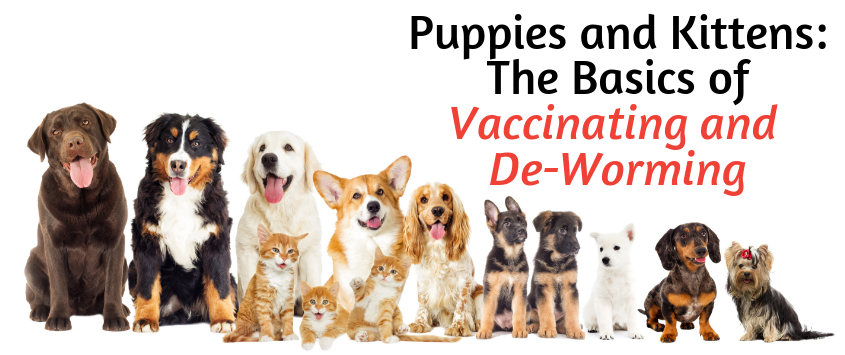
The addition of a new kitten or puppy to your family can be exciting. Along with the excitement and fun that a new pet brings, the responsibility of caring for your pets’ health will also become a new priority in your life. And while they certainly are adorable, both puppies and kittens can develop serious health problems if they don’t receive the basic care they need in their early lives. This includes having their necessary vaccinations to prevent serious illnesses and medications to prevent parasitic worms.
Puppies and kittens who nurse with their mothers build up anti-bodies in their systems to fight off sickness and infection in the first 6 to 8 weeks of their lives. That’s why it is important to begin vaccinations and preventive medicines immediately following this period in their development, to add to their bodies’ ability to resist disease.
Vaccinations Against Serious Illnesses
Upon reaching the age of 6 to 8 weeks, the first significant vaccination for both cats and dogs to have is for distemper. Distemper is a serious, contagious illness among dogs and cats that typically results in death if it’s not prevented via vaccination. For dogs, veterinarians use what is called the canine 5-in-1 vaccine, which includes the distemper vaccine plus vaccines for parvovirus (an infection of the immune system), two vaccines for adenovirus (hepatitis), and one for parainfluenza (canine flu). Similarly, for cats, the feline 3-in-1 vaccine provides protection against distemper plus herpesvirus and calicivirus (two types of serious respiratory infections).
Preventive De-Worming Medicines
Additionally, at the age of 6 to 8 weeks, most puppies and kittens should have their first de-worming medicine. These preventive, complete de-worming medications eliminate heartworm and any of the intestinal parasites including roundworm, hookworm and tapeworm. Heartworm is a deadly parasite, while the others are intestinal parasites that can cause a host of digestive problems and may be transmitted to other pets and humans if left untreated.
Ongoing Prevention
Booster shots of each vaccine should be scheduled every 3 to 4 weeks up to the age of 16 weeks for both cats and dogs. Rabies vaccinations, required in most states for puppies and kittens, can be given as early as 12 weeks and must be updated annually. Preventive medicines for heartworm and flea/tick control, given monthly, will also help reduce the risk of serious health problems for your pets. Be sure to consult with a veterinarian before beginning any treatment plan.
Do your pets have all the right vaccinations? Are they protected against the various worm-parasites? PetWow’s fully mobile home veterinary care can help! Serving more than 20,000 pets throughout the Greater Cincinnati/Northern Kentucky area, PetWow has offered top-notch animal care since 1998. Call or schedule an appointment with us today at 513-738-9691 or email [email protected]. For more pet care tips, follow us on Facebook, Twitter, Instagram, Pinterest or LinkedIn!





